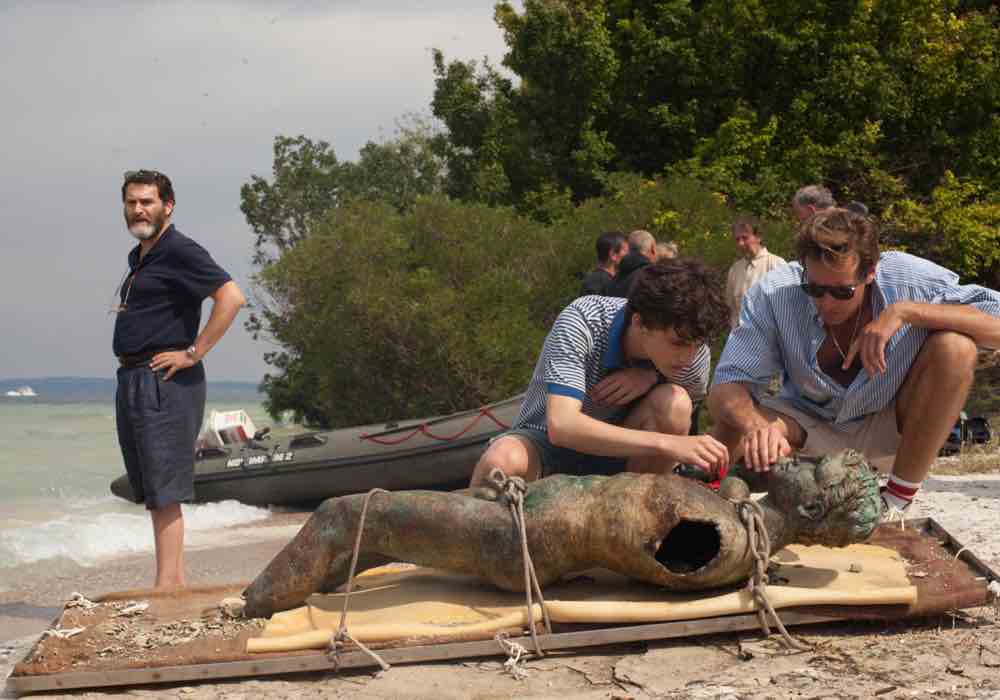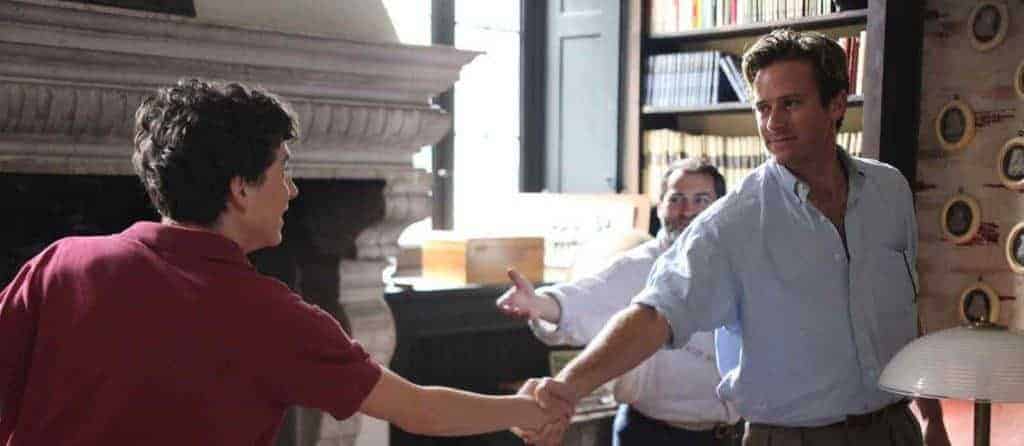In this review of Call Me by Your Name, Alex Heeney explores how Guadagnino captures what first love feels like, in all its fumbling, awkward, confusing, terrifying, joyous glory. This is an excerpt from the ebook Call Me by Your Name: A Special Issue. To read the entire article, purchase a copy of the book here.

Discover one film you didn’t know you needed:
Not in the zeitgeist. Not pushed by streamers.
But still easy to find — and worth sitting with.
And a guide to help you do just that.
Luca Guadagnino’s new film, Call Me by Your Name, is also his sweetest, calmest, and loveliest. It sneaks up on you. For 17-year-old Elio (Timothée Chalamet) and grad student Oliver (Armie Hammer), it’s both lust at first sight and a winding journey to each other — on bikes and in the water, through physical teasing and gentle intellectual one-upmanship in the Northern Italian countryside, summer 1983. Throughout, Guadagnino captures what first love feels like, in all its fumbling, awkward, confusing, terrifying, joyous glory.
[wcm_restrict]
[clickToTweet tweet=”Guadagnino captures first love in all its fumbling, awkward, confusing, terrifying, joyous glory.” quote=”Guadagnino captures first love in all its fumbling, awkward, confusing, terrifying, joyous glory.”]
The film’s action opens with Elio watching Oliver arrive at his family’s Italian summer house from the second floor window. Guadagnino’s camera looks down on Oliver from Elio’s point of view, the sound distant but audible. Elio declares, somewhat disapprovingly, that Oliver appears “very confident” before heading down to meet him. It’s emblematic of their initial relationship: Oliver is always glimpsed from a distance, Elio judging for fear of being judged, unaware that his vantage point offers him power over Oliver.
[clickToTweet tweet=”That Oliver is played by the lithe, handsome, 6’5’’ Armie Hammer makes him a greater fascination.” quote=”That Oliver is played by the lithe, handsome, and 6’5’’ Armie Hammer only makes him a greater source of fascination.”]
Oliver is staying with Elio’s family for six weeks to work as a research assistant to Elio’s father (Michael Stuhlbarg), a warm and gentle professor with an inclination to intellectual games. But Elio’s father and mother are terrific parents: always in the background, pushing things along, offering emotional support, but never interfering. Oliver is American, and therefore exotic; Elio’s family is quintessentially European, switching effortlessly from French to Italian to English from one sentence to the next. That Oliver is played by the lithe, handsome, and 6’5’’ Armie Hammer only makes him a greater source of fascination, for the family, for Elio’s friends, and finally, for Elio — though it takes him some time to admit this to himself..
Read more: Luca Guadagnino talks A Bigger Splash >>
With a few key exceptions, Gudagnino shoots from Elio’s perspective. Elio is almost always the closest figure to us in the frame. It’s his gaze we follow when we glimpse Oliver’s star of David necklace on a bed of chest hair, visible through his open t-shirt. And it’s his internal soundtrack we hear in the film when Elio reads a piece by Bach, bringing it to life in his head. Elio is often off in his own world, never quite comfortable among the kids his age and always a little out of place among his parents’ friends. He likes to read, transcribe music from his walkman, and sit off in corners.

Because Oliver is mysterious to Elio, we glimpse him mostly from a distance, at the back of the frame. As Oliver, Hammer is energetic and agile. He moves quickly and decisively, rushing out of the frame with an informal “later”. Elio thinks Oliver is arrogant; his father thinks Oliver is shy, a statement which at first seems strange to Elio considering how comfortable Oliver is laying his hand on Elio’s shoulder. To Oliver, it’s a subtle advance; to Elio it’s an insupportable liberty. It’s not until Elio sees Oliver dancing at an outdoor party that Elio allows himself to bask in the sight. Let’s just say Armie Hammer dancing to The Psychedelic Furs is going to be up there along with Ralph Fiennes dancing to the Stones in A Bigger Splash.
[clickToTweet tweet=”As Oliver, Hammer is energetic and agile. He moves quickly, decisively, rushing out of the frame.” quote=”As Oliver, Hammer is energetic and agile. He moves quickly and decisively, rushing out of the frame with an informal ‘later’. “]
Oliver’s and Elio’s relationship is one of mixed signals, abortive advances, and mutual respect and admiration. Their feelings are plainly obvious to everyone paying attention except each other. They’re always finding noncommittal ways to spend time together, especially alone. You can track the power dynamic in their relationship by who is following and who is leading when they bike together, amidst gorgeous, bucolic surroundings. Guadagnino saves his closeups, doling them out carefully for crucial moments. What’s important in his wide shots and medium shots is that Oliver and Elio share them — the first time they don’t is almost tragic, as we watch their insecurities play out.
[clickToTweet tweet=”Their relationship is one of mixed signals, abortive advances, mutual respect and admiration.” quote=”Oliver’s and Elio’s relationship is one of mixed signals, abortive advances, and mutual respect and admiration.”]
Once they start to give into their feelings, Guadagnino exquisitely captures the excitement of first love and the seemingly enormous step needed to get it moving. We can feel the gulf between them in the frame when lying next to each other in the meadow, desperate to reach out but not sure how to start. On the day Elio finally has a secret date with Oliver, Elio’s focus is on his watch, on which the camera is always lingering. When Elio finally meets Oliver, he’s practically shaking with nervousness and excitement, the terror and vulnerability all over his face.
Read more: Review: Desire is a dangerous dance in A Bigger Splash >>
Guadagnino has always been an expert at conveying sensuality on screen. It’s the lush landscapes, the emphasis on food and meals, and the curious but not leering gaze on his actors’ half-naked bodies. In Call Me by Your Name, it’s Armie Hammer in short-short swim trunks, the chest hair peeking out of his button down shirt, and Timothée Chalamet’s almost perpetually bare chest. Guadagnino finds more erotic power in a painful foot massage than the meshing together of bodies in intercourse (which we never explicitly see). What matters to Guadagnino is the casual entangling of limbs, the tentative gesture of playing footsie when you’re alone in a bedroom with no reason to hide, the tight and needy hug that says more than any perfunctory part of sex can. Guadagnino makes you want to live inside their relationship, their joy of discovery, even though it can’t last forever.
[clickToTweet tweet=”Guadagnino finds more erotic power in a painful foot massage than the meshing together of bodies.” quote=”Guadagnino finds more erotic power in a painful foot massage than the meshing together of bodies.”]
When their relationship ends with the summer, as we all know it must, it’s not the end. The film starts and ends with Elio. His relationship with Oliver is as much about gaining emotional maturity and self-confidence as it is about the two of them as a perfect duo, matched in intellect, kindness, and openness. The final shot, an extended closeup on Elio as the titles roll, captures all of this emotional complexity: the pain of loss, the newfound wisdom of love had, and the knowledge that life goes on.
This review was originally published on January 28, 2017.
Buy our Call Me by Your Name Special Issue eBook for 20% off with your members’ discount, and gain access to this issue the way it was meant to be read.
Want to read more Seventh Row content that’s similar to our review of Call Me by Your Name? 2017 was a terrific year for queer cinema, starting at the Sundance Film Festival. We loved God’s Own Country, which we also dedicated a Special Issue to. We were impressed by Eliza Hittman’s Beach Rats, and talked to her about her approach to mise en scene. We were also intrigued by how The Wound explores the way colonialism brought with it homophobia. Finally, we looked at the landscape of queer cinema for the year at the InsideOut Film Festival in Toronto and the Frameline Film Festival in San Francisco. [/wcm_restrict]


